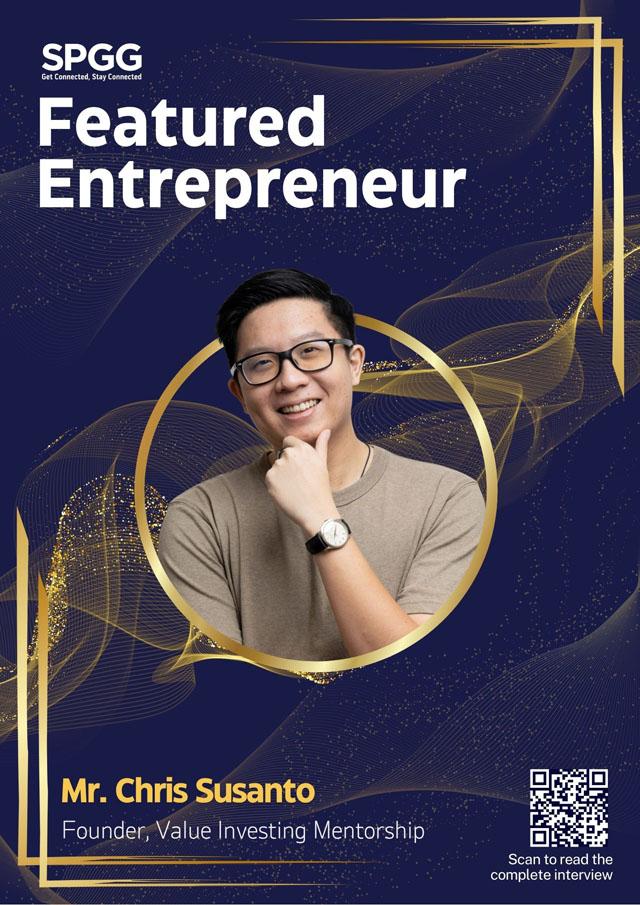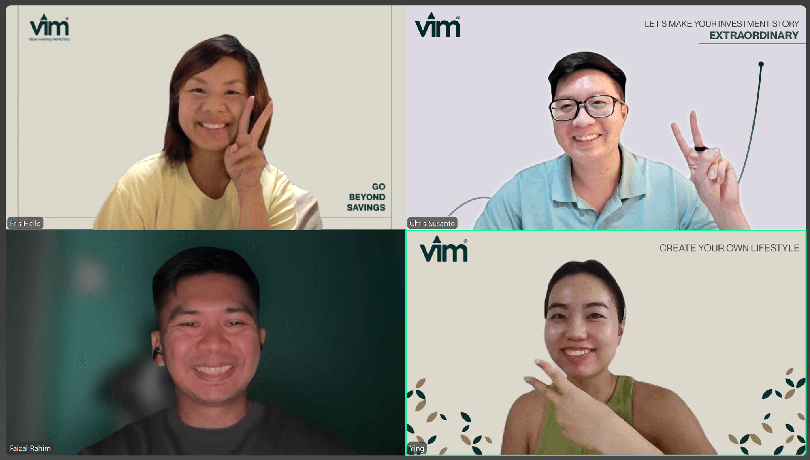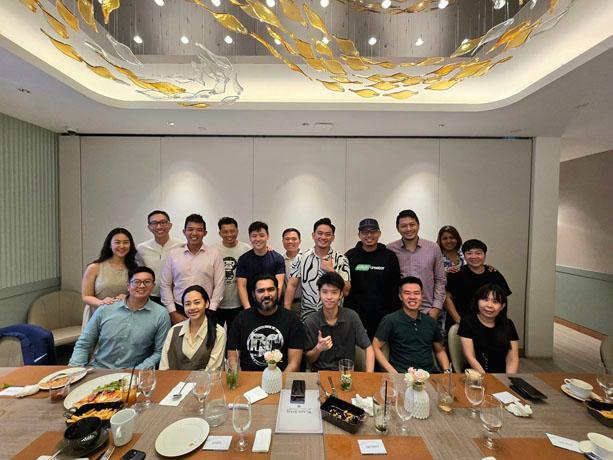
ENTREPRENEUR CLUB
Thank you for your interest in the SPGG Entrepreneur Club (EC)! Here’s a quick peek at what’s in store:
🏆
Monthly Networking Events: Join themed sessions on trending topics like tech and sustainability, where you can meet fellow entrepreneurs, share ideas, and build valuable connections.
🏆
Learning Labs: Participate in interactive sessions to gain or share expertise in key areas such as digital marketing and finance.
🏆
Mentorship Opportunities: Benefit from one-on-one mentorship with experienced entrepreneurs who are ready to share their journey, insights, and support.
🏆 Celebrate Success: Be inspired by our SPGG Featured Entrepreneur, where we recognize and celebrate the achievements of outstanding Members.
Take this step to advance your entrepreneurial journey with SPGG and join a community dedicated to growth, learning, and legacy-building.
Featured Entrepreneur
This month, our featured entrepreneur is Chris Susanto, the founder of Value Investing Mentorship (VIM) — an investor, educator, and entrepreneur passionate about helping others build lasting wealth through the timeless principles of value investing.
Since founding VIM, Chris has guided countless learners to think like business owners, not traders, and to invest with clarity, confidence, and purpose. His journey from curious investor to mentor reflects a deep belief that investing is not just about numbers, but about understanding and owning great businesses.

Can you tell us about your entrepreneurial journey? What inspired you to start your business?
I’ve always had a strong desire for self-improvement. Back in my Singapore Polytechnic days, I read many personal development books, and Rich Dad Poor Dad by Robert Kiyosaki opened my eyes to financial literacy and the importance of building assets.
That curiosity led me to discover value investing, inspired by Warren Buffett’s philosophy. It taught me to view stocks not as numbers to trade, but as ownership in real businesses, a mindset that completely transformed how I approached investing.
I’ve always believed that investing in knowledge is one of the best ways to grow, and knowledge compounds when applied. Therefore, in my 20s, I invested in courses to sharpen my skills.
Eventually, I shared my learning through a blog. I wrote educational articles about companies and value investing. Over time, I realised that many others wanted to learn how to invest too. That’s how Value Investing Mentorship (VIM) was born.
As investing can be a lonely journey, I wanted VIM as a close-knit and supportive community. Our members come from all walks of life, from law firm owners to teachers and engineers. What’s most fulfilling for me is seeing them learn not just to build wealth, but to gain a lifelong investing skill.
Unlike many investment courses, each VIM cohort accepts only three to four students—so we can focus on a smarter, calmer approach to long-term investing in an intimate setting. This smaller group format gives us more bandwidth to answer nuanced questions, tailor feedback, and build genuine understanding. It’s more private, more authentic, and more aligned with how serious investors actually learn. Our philosophy is to learn to earn with your mind, not your time.
What was the biggest challenge you faced when starting out, and how did you overcome it?
One of the challenges I faced was demystifying the complex world of investing for people from all walks of life. Each learner comes with different experiences and expectations; some have invested in stocks before, others are complete beginners. My challenge was to create a learning environment that works for everyone, regardless of their starting point.
At VIM, my role isn’t just to teach investing techniques but also to shape the right mindset and mental models for long-term success. We guide students through a one-year journey with about 18 lessons, each including short, practical assignments to help them apply what they’ve learned.
It’s not about perfection, it’s about progress. We try to make investing fun and remind our students that learning should be enjoyable, not stressful. Ultimately, my goal is to help them understand businesses enough to make smart, informed investment decisions.

How do you identify and seize new opportunities in your industry?
The principles we teach are essentially timeless. Value investing has been around for over a century, dating back to Benjamin Graham in the 1920s. Unlike fast-changing industries like tech, the fundamentals remain constant: understanding whether a business is good, and at what price it becomes a worthwhile investment. These principles will still apply 20 years from now—because they’re rooted in logic, not trends.
Where opportunities evolve is in how we learn and apply these principles. Since starting VIM, I’ve conducted all lessons online via Zoom so learners can rewatch sessions and learn at their own pace, from anywhere in the world. All our materials are hosted digitally for easy access.
We’ve also started using AI chatbots as research assistants, for instance, to analyze a company’s management or to help explain parts of the valuation process. While we don’t follow them blindly, they are useful tools to improve research efficiency and critical thinking.
Who has been your biggest inspiration or mentor, and why?
My biggest inspiration would be Warren Buffett, and I believe he’s an inspiration to many others as well. It’s not just his remarkable investing skills, but his consistency and discipline. In fact, 99% of Warren Buffett’s net worth was built after the age of 50, demonstrating the power of compounding. It’s a reminder that in both investing and life, consistency beats intensity.
I’m also inspired by his humility. Despite being one of the richest men in the world, he still lives in the same house he bought decades ago, which is a rare and admirable groundedness.
For me, consistency comes from genuinely enjoying what you do then it doesn’t feel forced. I love investing; I’ve been investing since my 20s and teaching for about eight years now. Even on days when I’m not working, I’ll still find myself reading, analyzing stocks, or studying companies simply because I love it.
As Warren Buffett once said, he “tap dances to work”, and I completely understand that feeling. When you love what you do, consistency follows naturally.
What’s one piece of advice you wish you had received earlier in your entrepreneurial journey?
One piece of advice I wish I had received earlier is to start learning how to meditate properly. I’ve been meditating for about three years now, but if I had started twelve years ago, I believe I would have done even better in life and business.
Meditation is often underrated, but it’s incredibly powerful when done correctly. It’s not easy to learn, which is why I chose to learn from a teacher which made all the difference. I practise Transcendental Meditation, which is non-religious and involves two 20-minute sessions a day.
This is also the same technique used by billionaire fund manager, Ray Dalio, who attributes much of his success to it. He once shared that meditation allows him to see things in “slower motion”.
I’ve found that to be true. Meditation has helped me stay calm, make better decisions, and enjoy life more. It’s a skill, and in many ways, a superpower because it allows you to reset and recharge every day.

What legacy do you hope to leave through your work?
I don’t see legacy as something that has to be intentionally created or left behind. For me, it’s more important to live life fully. There’s a quote I really like: “Live life fully so you can die empty.” It reminds me to focus on being present and enjoying the journey.
That said, I do find meaning in being able to teach others how to invest. If my work helps people make their savings work harder for them, gain another source of income, and achieve a greater sense of financial freedom, then that in itself is deeply fulfilling.
To me, a legacy doesn’t have to be planned; it can simply be the natural result of doing meaningful work and impacting lives along the way.
For more information on Chris’s business, visit his website at https://www.vim.sg/